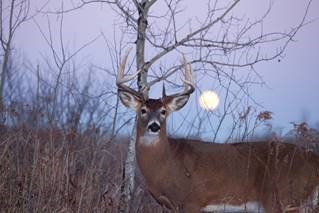Conservation Congress Urges Governor to Veto
Provision for Hunter Dollars to Pay for Deer Farm CWD Research
The Wisconsin Conservation Congress is urging Governor Tony Evers to veto a budget item that would give $100,000 of DNR hunting fees to the deer farm industry for CWD research that has no value for wild deer or the state’s deer hunters. WCC has sent a letter to the governor asking for a veto and also has partnered with several other sporting groups in a joint letter requesting a line item veto of this provision.
“Taking money generated by hunters to support a study that will only be useful in a captive setting creates a bad precedent,” said WCC Chairman Larry Bonde. “We encourage the DNR to utilize this hunting license money to step up CWD testing in wild deer or to help fund a more robust dumpster program to help take CWD-infected carcasses off the Wisconsin landscape,” he said, adding that genetic research funding for the high-fence deer herd could come instead from the captive deer farm industry or the Department of Agriculture, Trade and Consumer Protection that oversees it.
The Joint Finance Committee in June voted 12-4 along party lines to include in the budget sent to Governor Evers this provision to give $100,000 of DNR bonus antlerless permit revenue to the proposed research project that the deer farm industry has been trying to fund. Lobbyist Bob Welch of Whitetails of Wisconsin, the captive deer industry’s trade organization, proposed the idea of using hunters’ dollars.
CWD is always fatal for deer. The genes of certain captive deer infected by CWD may allow them to live about eight months longer that other deer. The proposed research involves studying the CWD-resistant genetics in captive deer.
Former Wisconsin Natural Resources Board Chairman Dave Clausen, a retired veterinarian, said, “This is a hand-out to the deer farmers, nothing more. The resistant animals are relatively rare in nature, and they lack fitness seen in other deer, so it just wouldn’t work.”
The proposed research would include bringing deer to a deer farm in Lafayette County, part of Senator Howard Marklein’s District 17. Sen. Marklein is on the Joint Finance Committee and was one of the 12 Republicans who voted in favor of transferring hunters’ dollars to the deer industry research project. The proposed research site is Windy Hill Whitetails, a double-fenced operation in Mineral Point that was de-populated in 2018 after its herd tested positive for CWD.
WCC supports CWD research and action that helps wild deer and hunters but opposes funding the proposed study that has no current value to Wisconsin’s wild deer herd. During the CWD review process that WCC jointly lead with DNR and DATCP, Dr. Nick Haley, veterinarian and Assistant Professor at Midwestern University in Glendale, Arizona, was asked how this new deer farm study he is leading would work on a wild population. He reported that it would have, “no practical application on a wild population of white-tailed deer.”
In addition to Bonde’s official veto request letter, WCC also partnered with other outdoor groups and sent a separate joint letter to Governor Evers asking for his veto on the use of the $100,000 of hunting fees for the deer farming industry’s study.
Bonde encouraged hunters and other groups concerned with where their deer license dollars are being spent to contact Governor Evers as well as members of the Joint Finance Committee to express their concerns with using hunter dollars to support research on the captive deer population.
